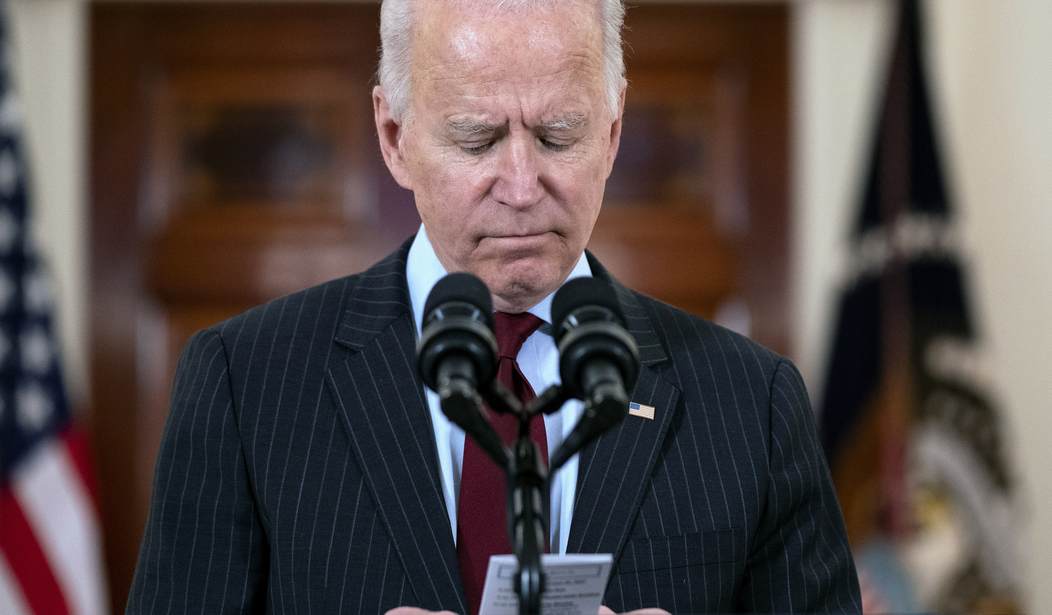Instead of turning the other cheek, as the Obama/Biden administration mostly did, President Biden followed the peace through strength philosophy when he struck Iranian-backed militias in Syria. The was in retaliation for an attack on U.S. interests.
A total of 14 rockets were launched on February 15 into Irbil in Iraq, targeting a U.S. facility. The rockets landed near the U.S. military base and ended up killing a civilian contractor. One U.S. service member suffered a concussion, while another five civilian contractors were injured.
This was "a dangerous escalation and a criminal terrorist attack,” said Iraqi President Barham Salih.
The rockets were fired by hostile Iranian-backed militias, meaning that the U.S. needed a proper response. During the Obama/Biden years, the proper response in nearly every instance was to turn the other cheek, even allowing adversaries to cross “red lines” without any U.S. response other than some verbal condemnation.
After eight years of that policy, ISIS had set up a Caliphate which controlled about a third of Syria and 40% of Iraq. They slaughtered thousands of people, some very brutally. Russia had invaded and eventually annexed part of the Ukraine. North Korea was firing missiles over friendly countries. China was expanding militarily and starting to occupy territories.
Iran was flush with billions of dollars in cash which was used to finance terrorism in the Middle East and they were perhaps a decade away from having nuclear weapons.
Recommended
Turning the other cheek was an obvious failure.
The Trump administration followed the peace through strength philosophy. That essentially says to show potential adversaries that the U.S. is so strong that any confrontation would result in a U.S. victory and a devastating defeat for the opponent. In fact, this philosophy says, the stronger the military becomes, the less likely it will ever be used.
This philosophy required some use of force to demonstrate just how powerful the U.S. is. Force was used to wipe out the entire ISIS caliphate. Arms were sent to the Ukraine so they are in a better position to defend themselves. A powerful bomb was dropped in Syria.
Standing up to China is complicated, but the Trump administration did just that, at least from a position of economic strength.
North Korea has stopped most of their missile launching. That situation is very complicated and many past presidents had much difficulty reasoning with the North Korea regime.
During the last four years, each time Iran took an offensive action against the US, our military responded, sometimes not immediately but always very profoundly. The Trump Administration also reasoned that the US has much financial strength that can be used as a weapon. The use of sanctions crippled the Iranian economy. That should lead to their willingness to negotiate.
Iran’s recent aggression was meant as a test to see which policy President Biden would follow. If Iran launched a small attack on U.S. interests, would Biden turn the other cheek? Or would Biden continue with the peace through strength philosophy and retaliate?
Iran was hoping Biden would respond with the verbal condemnation and perhaps some warnings about crossing red lines. Had they gotten that, turn the other cheek response, they would have undertaken another more severe attack to see just how far they could push the new president.
This is an important time for the Iran/U.S. relationship. Iran’s economy is in terrible shape with high unemployment and high inflation. They need to have the U.S. imposed sanctions lifted as soon as possible. In fact, they are demanding that before they start negotiations with Biden.
Considering all of these factors, Biden took the correct peace through strength action, by striking at Iranian-backed militias, even if they were in Syria. It shows that the U.S. will not turn the other cheek and that we still intend to use force when appropriate. And we will always defend our interests.
The Pentagon termed the airstrikes “proportionate” and that the action sent an “unambiguous message.” It is reported that the Defense Department presented Biden with a number of military response options. It is said that he chose the least aggressive.
Politically that was probably his best choice. From a strictly peace-through-strength philosophy, the response should have been more intense. This view says that the response to an aggressive action should be a more aggressive action. While that view carries risk, the weaker nation will usually back down.
Everything considered it is a good thing that President Biden is carrying on with the Trump administration's defense strategy.
Michael Busler, Ph.D. is a public policy analyst and a Professor of Finance at Stockton University where he teaches undergraduate and graduate courses in Finance and Economics.

























Join the conversation as a VIP Member